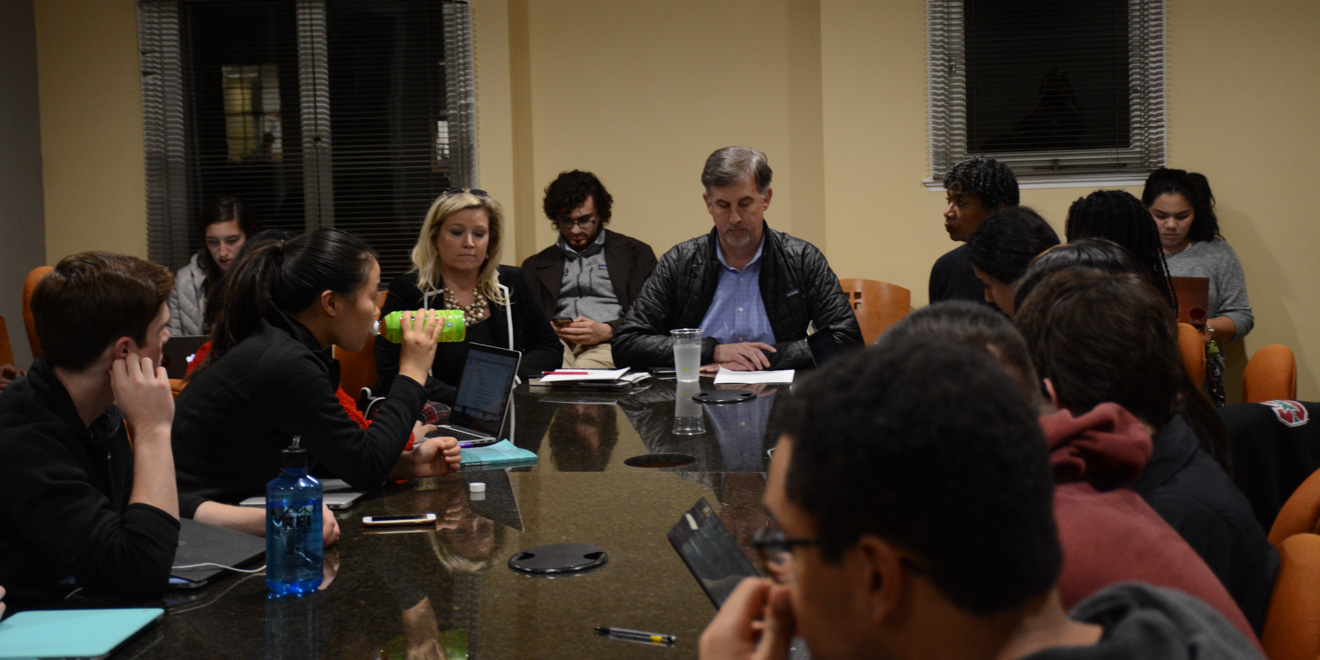In the 19th Undergraduate Senate’s meeting on Tuesday night, Residential and Dining Enterprises (R&DE) administrators visited the Senate to discuss recent controversy surrounding understaffing and heavy workloads in dining halls.
Executive Director of R&DE Stanford Dining Eric Montell told the Senate that he is currently conducting “listening tours” to meet with individual dining workers around campus and that R&DE is in the process of modifying its current hiring practices.
To help address understaffing, Montell said R&DE is offering a financial incentive of 100 dollars to current dining hall staff who successfully recruit new workers. R&DE also hopes to hire more students and streamline the hiring process so that new hires can be more promptly approved.
Executive Director of R&DE Human Resources Ann Marie Musto, who was also present, said that R&DE consistently recruits potential workers at job fairs in the area. Aside from hiring students from nearby colleges, R&DE has also partnered with Downtown Streets in San Jose, an organization dedicated to providing support to homeless and jobless individuals. According to Musto, several individuals from Downtown Streets have been successfully placed in dining hall positions.

Senator Doris Rodriguez ’20 asked Montell to discuss the recent request for Stanford workers to remove stickers saying “Respect and a Fair Workload.” Rodriguez said she felt that this decision contradicted Montell’s statement that he was “thankful to the workers for voicing their concerns.” According to Montell, the request was executed by University HR.
“I try to be honest and realistic about what I have control of,” Montell said. “I manage the staffing. We have not done our job in filling vacancies, and that’s on us, and we’re trying to improve it.”
According to Montell, R&DE is currently piloting ideas suggested by dining hall staff, including a training program for casual employees lacking culinary experience to become cooks, as well as a “floater” position allowing staff to work in various dining halls around campus rather than being stationed at one dining hall.
Senator Ana Queiroz ’20 said she sees a “culture of fear” in University dining halls. According to Queiroz, some workers “got nervous” when the Student and Labor Alliance reached out about organizing a workers’ appreciation event. Moreover, Rodriguez claimed that workers are verbally instructed not to establish connections with students.
“[R&DE’s] ‘culture of excellence’ is being translated into a culture of fear because students try to talk to workers, and workers don’t want to talk,” Queiroz said. “We have to go through a lot to know what’s going on, and that creates a disconnect between students and workers.”
Montell said that there is no R&DE policy preventing workers from talking to students.
“Students can talk to workers at any time, and they do,” Montell responded. “They work in an environment where they have to serve lunch at lunchtime … sometimes they have to get back to work. [What you’re describing] is not the environment that I see.”
Senator Aamnah Khalid ’20 shifted the conversation towards fair wages. Khalid asked Montell for his thoughts on raising wages to make dining hall jobs more lucrative, given the University’s resources and considering the long commutes many workers make on a daily basis.
Montell responded that R&DE, as an auxiliary division, does not receive funding from Stanford’s endowment — it is completely funded by revenues, mainly generated by student meal plan payments. Thus, he said, increasing wages would mean increasing students’ meal plan costs.
“I do not have the ability to set the living wage rate,” Montell remarked. “In the context of how we are funded, what meal plan cost would you or your parents be willing to pay to increase wages?”
Montell added that he has been working on improving communication with students. For example, R&DE placed flyers in dining areas; however, students have been removing R&DE’s messages in protest. According to Montell, one student left a comment card to specifically tell R&DE that students, not dining workers, were responsible for removing the table tents because they disagreed with their “propaganda.”
“We hope students will make a balanced or informed idea,” Montell said. “Students don’t have to agree with everything … or anything we say. We just want both sides of the conversation to occur.”
Contact Melissa Santos at melissasantos ‘at’ stanford.edu.
An earlier version of this article incorrectly stated Eric Montell’s title as Executive Director of R&DE. In fact, Montell is Executive Director of R&DE Stanford Dining.
